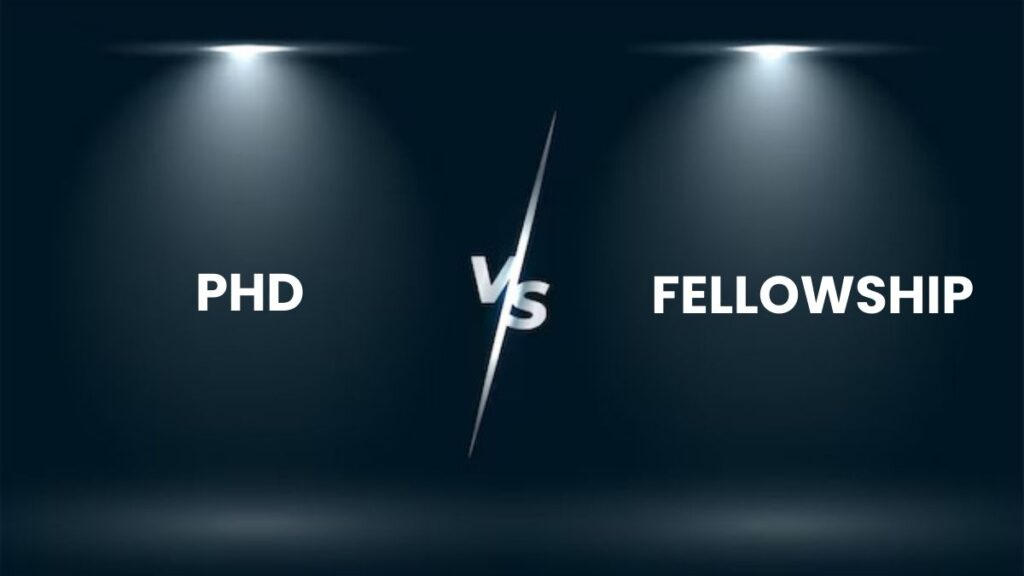Are you trying to step into the advanced academic path? Does a PhD degree attract your researcher’s mind? Wondering what a fellowship programme is all about? When all these questions plague your mind persistently, you are bound to feel clueless. Considering the adage “A little knowledge is a dangerous thing,”you must buck up and look for the right opportunity to enhance your knowledge base. If you are stuck between opting for a fellowship programme and a PhD, sorting the differences would help you make an informed decision.
What is a PhD programme?
PhD or Doctor of Philosophy is the highest academic degree any individual can earn in a specific field of study. It is usually awarded in disciplines like humanities, science, engineering, or social science. To earn this degree, you must be involved in several years of coursework and complete the thesis or dissertation writing highlighting a significant contribution in this field.Furthermore, the path one needs to traverse to obtain the PhD degree requires a high level of dedication, the ability to conduct research independently, and critical thinking skills.
Besides, the candidates pursuing a doctoral programme must demonstrate the highest level of skills in the specific area in their field and demonstrate the prowess to produce original and scholarly work that exceeds generic knowledge boundaries.That is why they are often referred to as PhD scholars. The process of pursuing this degree equips candidates with analytical, problem-solving, and communication skills. After the completion of this degree programme, candidates become the highest experts in their field and pursue a professional career in the field of academics and research.
What is a fellowship programme?
A fellowship is a short-term funding that may last up to several years. It usually aims to promote the professional development of the individual opting for the programme and is usually hosted by an organisation that is willing to extend its assistance to any eligible individual trying to seek leadership in the field.
The support or the fund obtained through fellowship allows a student to pursue academic work, handle research projects, and advanced training. So, anyone from graduate individuals to post-doctoral researchers can opt for a fellowship programme based on the scope of the project. Typically, it is a merit-based scholarship needed for advanced studies.

Eligibility: Fellowship and PhD programme
- PhD programme: To pursue a PhD programme, a candidate needs to complete a Master’s degree and apply to those who are keen to engage in rigorous and long-term research.
- Fellowship Programme: Fellowships generally apply to individuals who have already completed a graduate or even post-doctoral programme. It is for those who want to pursue additional research in a specific field for training and experience. Doctoral fellowships bear testimony to these grants.
Duration: Fellowship and PhD programme
- PhD programme: The duration of this programme continues for about three to five years or even more. However, the exact tenure may depend on the field of study and the country from which you are pursuing the programme.
- Fellowship programme: Fellowships are usually short-term programmes that may not exceed a few months or years. Although the duration may vary based on the nature of the fellowship, it may not extend as long as PhD coursework programmes do.
Funding: Fellowship and PhD programme
- PhD programme: The PhD scholars receive funding through scholarships, teaching and research assistantships, and university stipends. This funding aims to support their living and academic expenses during the coursework up to the completion of the programme.
- Fellowship programme: Fellowships usually offer financial support for those who want to pursue advanced research like doctoral fellowships. The funding here comes through research institutions, foundations, and private,and government agencies.
Result:Fellowship and PhD programme
- PhD programme: The PhD programme culminates in the doctoral degree that any candidate earns in a specific field. After earning the degree, an individual may consider career opportunities in the field of academic or research.
- Fellowship programme: Fellowships have nothing to do with any degree but assist any individualin further career development by offering short-term funds, leading to new research or career development.
Reasons to choose a fellowship programme
You are aware of how fellowship programmes assist in advanced research but here are a few reasons why someone would want to opt for it:
- Fellowship programmes allow an individual to go through constructive phases of learning engage with like-minded people and deal with future leaders and mid-career professionals.
- Fellowships allow the aspirants to participate in various practical assignments for personality development
- Meeting people from diverse educational and cultural backgrounds
Reasons to choose a PhD programme
A PhD degree allows an individual to continue research in any field that makes you passionate. Therefore, you can decide what you need to work on and meet your academic goals with the help of a supervisory team. Here is why you need to pursue a PhD programme:
- Become an expert in any field
- Learn with the peers
- Rev up your career by becoming a researcher or a subject matter expert
- Expand networking opportunities and meet diverse people with a similar passion
A PhD programme is an academic journey that eligible students pursue after the completion of the Master’s degree. On the other hand, the fellowship is a short-term funding programme that focuses on advanced research and career development. If you need help with obtaining a PhD degree, collaborate with Decode DNA for thesis writing services. Click here for more information.
FAQs
- Can you pursue PhD without a fellowship?
Yes, it is not mandatory to have a fellowship when getting admission into a PhD programme in India.
- What is the difference between a PhD fellow and a PhD student?
A PhD student is one who enrols for the programme and gets funds through teaching or university stipend and a PhD fellow is one who receives a fellowship to pursue a doctoral programme.
- I have a Bachelor’s degree. Can I apply for a PhD coursework?
Yes, you can but it may not be that simple as the most common path of progression is earning a Bachelor’s degree, Master’s degree, and PhD.

